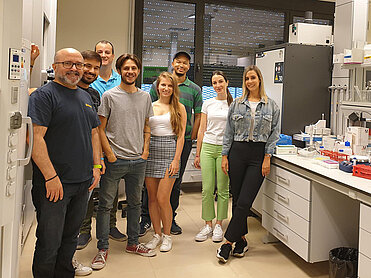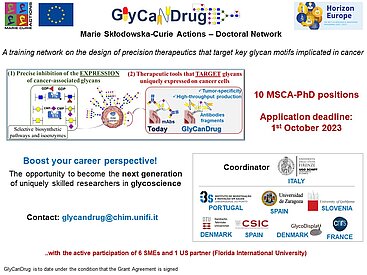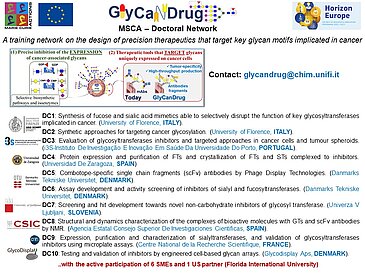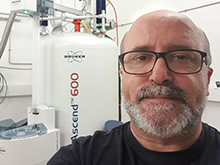In 2024, the European project GlyCanDrug will begin, an initiative that will bring together 15 leaders in the study of natural sugars present in cells for four years. Among them, there is a team from the Institute of Chemical Research that will participate in the development of new synthetic molecules with which to mimic the sugars that surround the cell surface to attack cancer cells.
The immune system is prepared to get rid of abnormal cells. As a safety mechanism, healthy cells incorporate elements that are recognized by the immune system, thus avoiding an attack by mistake. However, cancer cells incorporate specific sugar molecules that allow these safety mechanisms to be manipulated to ultimately deactivate the attacks of the immune system.
“The GlyCanDrug project involves developing a novel strategy to tackle cancer: understanding the sugars that surround the cell surface in order to attack cancer cells. We can expect to develop potential drugs based on molecules that mimic natural sugars (glycomimetics),” explains Jesús Ángulo, principal investigator of the IIQ group participating in the project. The new molecules will be based on the aforementioned glycomimetics, that is, on molecules synthesized in the laboratory in order to mimic the natural sugars present in the cell. These will allow access to new precision oncological treatments.
The team from Jesús Angulo’s Group will lead the area of structural glycobiology, whose objective is the characterization at a molecular level of the interactions between the synthesized glycomimetics and a type of enzyme (glycosyltransferases), present in all cells, which catalyze the transfer of sugar molecules. These enzymes are responsible for the synthesis of antigenic glycans (compounds made up of one or more sugars that generate the production of antibodies) associated with cancer. In addition, they will study the interactions of the enzymes with antibodies formed by various immunoglobulin regions, known as scFv and of great relevance in immunotherapy.
The use of high-resolution NMR (nuclear magnetic resonance) spectroscopy and computational chemistry, with the aim of elucidating the molecular bases of these biomolecular interactions, will allow the development of better drugs based on the inhibition of the aforementioned glycoenzymes, active in carcinogenic processes.

Biomolecular Interactions and Structural Glycobiology Group
The impact of the project could be significant in several ways: “By advancing the field of glycoscience and developing precision therapies targeting cancer-associated glycans, we hope to have the possibility of overcoming the limitations of current targeted therapies and offering new opportunities for cancer treatment. This could help in understanding the heterogeneity of cancer, which could lead to better treatments for patients thanks to the development of new therapeutic approaches,” explains Angulo.
In addition, the project also aims to train a new generation of young doctors qualified in glycan-based therapies, “which will contribute to Europe’s innovation capacity and create employment opportunities both in academia and industry,” he adds. To this end, the recruitment of ten PhD students is planned, one of whom will carry out his research activities at the IIQ to acquire necessary and unique skills in a cutting-edge field.
The GlyCanDrug project (Design of precision therapeutics that target key glycan motifs involved in cancer) has received funding of 2.7 million euros from the European Union’s Horizon Europe framework programme. It is made up of an international network of eight academic partners (UniFi; IIQ-CSIC, in Spain; the Technical University of Denmark; the University of Ljubljana; the Centre National de la Recherche Scientifique, in France; the University of Porto; the University of Zaragoza; and the University of Copenhagen); and six industrial partners (GlyXera GmbH and Crelux GmbH, in Germany; CiMaas, in the Netherlands; PAIA Biotech GmbH, in Germany; Carbohyde, in Hungary; and Innovation Acta SRL, in Italy).
The project has just announced the recruitment of 10 PhD students, one of whom will carry out his research activities at IIQ “acquiring the necessary and unique skills in a cutting-edge field.”
To be eligible for the PhD thesis placement offer: please attach the project poster with all the information. The IIQ offers a PhD thesis in the research line “DC8: Structural and dynamics characterization of the complexes of bioactive molecules with glycosyltransferases and scFv antibodies by NMR spectroscopy.”





